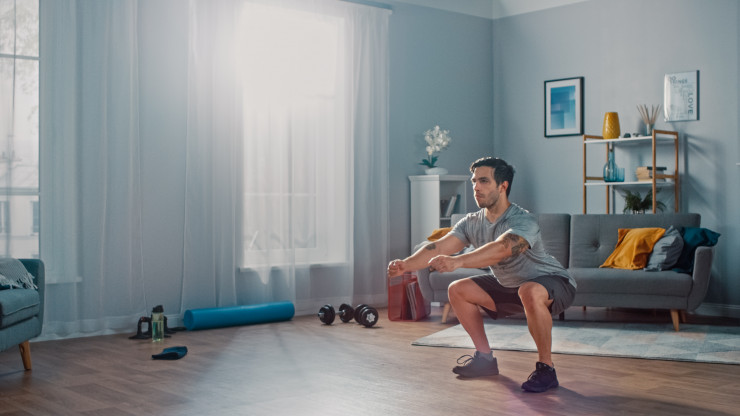Did you know that 34% of men and 42% of women in the UK aren’t getting enough exercise to stay healthy? Or that our increasingly sedentary lifestyles could be contributing to tens of thousands of deaths per year?
Here at Whitworth, we believe prevention is always better than cure when it comes to health.
That’s why this month, we’re launching a brand-new FREE fitness challenge called ‘Get Active with Whitworth’ to get you up off your sofa and get moving. (Have you signed up to take part yet? You have until midnight on the 2nd of August, click here for info)
To help you feel inspired to take up the challenge, we’ve gathered together everything you need to know including how much exercise you should really be getting and how it can improve your health.
What are the benefits of getting active?
Exercise has a wide range of benefits for your health and your wellbeing. Here are just some of them.
It makes you healthier
Getting regular exercise is one of the most effective ways you can stay healthier or even ease your existing health problems.
Simple exercise such as running, walking, swimming or cycling can help reduce your risk of suffering from heart disease, type 2 diabetes, dementia, stroke, Alzheimer’s and certain cancers.
It can also help reduce your blood pressure, strengthen your bones and get your cholesterol levels under control. (Always speak to a medical professional if you want to reduce your medication.)
It helps you feel better
When you get regular exercise, you feel happier, more positive, and better able to handle whatever stresses or challenges that life may throw your way. As you move your body, your brain gets flooded with feel-good hormones that can boost your mood and ease any mental health problems. The fitter you become and the more you see the results of your hard work you’ll feel proud of yourself, boost your self-esteem and get a stronger sense of achievement and purpose. This can really help at uncertain times like these.
It boosts your energy and improve your sleep
Exercise might feel like the last thing you want to do when you’re feeling weary, but studies have shown that it can actually help you feel better. Even a brisk 15-minute walk in the fresh air can be all it takes to perk you up and boost your energy levels.
Not only that but exercise helps you to fall asleep faster, and get a better night’s sleep. If you’re struggling with insomnia, why not try getting some exercise an hour or two before bed?
It helps keep your weight under control
If you become more active, your body will burn more calories and store less of them as fat, helping you to better control your weight. Over the long term, exercise also helps boost your metabolism and increases your lean body mass which helps you to burn even more calories.
Add to that the stress-relieving, confidence boosting effects of exercise and you have the perfect recipe for weight-loss.
Having said that, you should also make healthier food choices if you want to lose a significant amount of weight.
How much exercise should I be getting?
Ideally, you should be as active as possible if you want to keep yourself healthy, although this doesn’t always have to leave you out of breath and feeling hot and sweaty.
According to a growing body of research, simply getting onto your feet more often and moving your body can benefit your health significantly. The easiest way to do this is to start by building as much activity into your day as possible.
For example, stand up from your desk every hour or so, walk short distances instead of driving, go for a walk after your evening meal instead of watching the TV or take the stairs instead of the lift. These small changes will make a big difference.
However, this in itself won’t be enough to get you feeling healthier and happier. You should also be doing exercise that gets your heart pumping and leaves you out of breath.
According to current NHS recommendations, you should be getting a minimum of 150 minutes of moderate activity or 70 minutes of vigorous activity every week.
Moderate activity is the kind that gets your heart rate up and leaves you feeling warm. You should still be able to talk but not sing at this level of activity.
Vigorous activity will also get your heart rate up and get you feeling warm or even sweaty. You should still be able to talk at this level but only say a few words because you’re so out of breath!
In addition to this, you should also work to improve your strength on at least two days per week.
This may sound like a lot, but when you break it down, it’s actually quite achievable. If you exercised every day of the week, you’d only need to get around 20 minutes per day to hit your target.
You can even split it into two sessions of ten minutes per day if that fits in better with your schedule and lifestyle.
What counts as physical exercise?
With the above guidelines in mind, we’ve gathered together some ideas of some excellent ways you can get active. To help you meet your government requirements, we’ve broken them down into categories of general activity, moderate activity and vigorous.
General activity
Whenever possible, avoid sitting down as much as you can. Ideas include:
Getting a standing desk at work
Taking phone calls on your feet or walking around
Going for a walk after dinner
Walking short distances instead of taking the car
Taking the stairs instead of the lift or escalator
Playing with the kids in the garden or the park
Take your dog for a walk
Do some light gardening
Moderate activity
Again, you should be feeling warm and your heart rate should be up, but you should still be able to talk. Great activities include:
Jogging (depending on your level of fitness)
Brisk walking
Low impact aerobics
Riding a bike
Dancing
Tennis
Cutting the grass
Hiking
Rollerblading
Doing an NHS online workout or YouTube
Vigorous activity
This should really get you puffing and panting, but you should still be able to say a few words. Why not try one of the following?
Running
Aerobics/ Zumba
Gymnastics
Martial arts
Riding a bike on hilly terrain or fast
Sports like football, netball, hockey
Skipping
HIIT workouts
Doing an NHS workout or on YouTube
Strength exercises
You don’t have to do a specific workout or go to the gym to fit some strength exercises into your day. Here are some ideas:
Carrying heavy shopping bags
Heavy gardening like digging
Lift or carry a child
Yoga
Using weights
Using resistance bands
Pilates
Tai Chi
Summary
If you want to improve your health, the easiest thing you can do is get more exercise. Not only will it reduce your risk of suffering from several chronic illnesses, it can also help reduce stress, help you lose weight and it’s a lot of fun too.
If you’d like any further advice on reaching or maintaining a healthy weight, exercise or any of the other issues mentioned here, please get in touch with your local branch. We’re a Healthy Living pharmacy and we’re always here to help.



